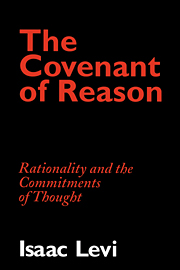Book contents
- Frontmatter
- Contents
- Introduction
- 1 Rationality and commitment
- 2 Rationality, prediction, and autonomous choice
- 3 The logic of full belief
- 4 Consequentialism and sequential choice
- 5 Prediction, deliberation, and correlated equilibrium
- 6 On indeterminate probabilities
- 7 Consensus as shared agreement and outcome of inquiry
- 8 Compromising Bayesianism: A plea for indeterminacy
- 9 Pareto unanimity and consensus
- 10 The paradoxes of Allais and Ellsberg
- 11 Conflict and inquiry
- 12 The ethics of controversy
- Name Index
- Subject Index
2 - Rationality, prediction, and autonomous choice
Published online by Cambridge University Press: 05 June 2012
- Frontmatter
- Contents
- Introduction
- 1 Rationality and commitment
- 2 Rationality, prediction, and autonomous choice
- 3 The logic of full belief
- 4 Consequentialism and sequential choice
- 5 Prediction, deliberation, and correlated equilibrium
- 6 On indeterminate probabilities
- 7 Consensus as shared agreement and outcome of inquiry
- 8 Compromising Bayesianism: A plea for indeterminacy
- 9 Pareto unanimity and consensus
- 10 The paradoxes of Allais and Ellsberg
- 11 Conflict and inquiry
- 12 The ethics of controversy
- Name Index
- Subject Index
Summary
Principles of rationality are invoked for several purposes: they are often deployed in explanation and prediction; they are also used to set standards for rational health for deliberating agents or to furnish blueprints for rational automata; and they are intended as guides to perplexed decision makers seeking to regulate their own attitudes and conduct. These purposes are quite different. It is far from obvious that what serves well in one capacity will do so in another. Indeed, I shall argue later on in this essay that when principles of rationality are intended for use as norms for self-criticism, they cannot also serve as laws in explanation and prediction or as blueprints for rational automata.
Whether such principles are used for explanatory purposes, for setting standards or for self policing, issues arise as to the scope of applicability of principles of rationality. Such principles are often employed to evaluate decisions as well as the attitudes which allegedly inform them. Whether principles of rationality are relatively weak constraints of ‘coherence’ and ‘consistency’ on belief, desire, probability judgment and other propositional attitudes is by no means settled. Many writers argue to the contrary. They insist that norms of rationality should be ‘thickened’ to include more substantive specifications of the beliefs, values, probability judgments which agents should have. At the thicker end of the spectrum, for example, is found the idea that morality and politics should somehow be derived from a conception of rationality, that factual beliefs and probability judgments should be rationally determined by ‘evidence.’
- Type
- Chapter
- Information
- The Covenant of ReasonRationality and the Commitments of Thought, pp. 19 - 39Publisher: Cambridge University PressPrint publication year: 1997
- 5
- Cited by



